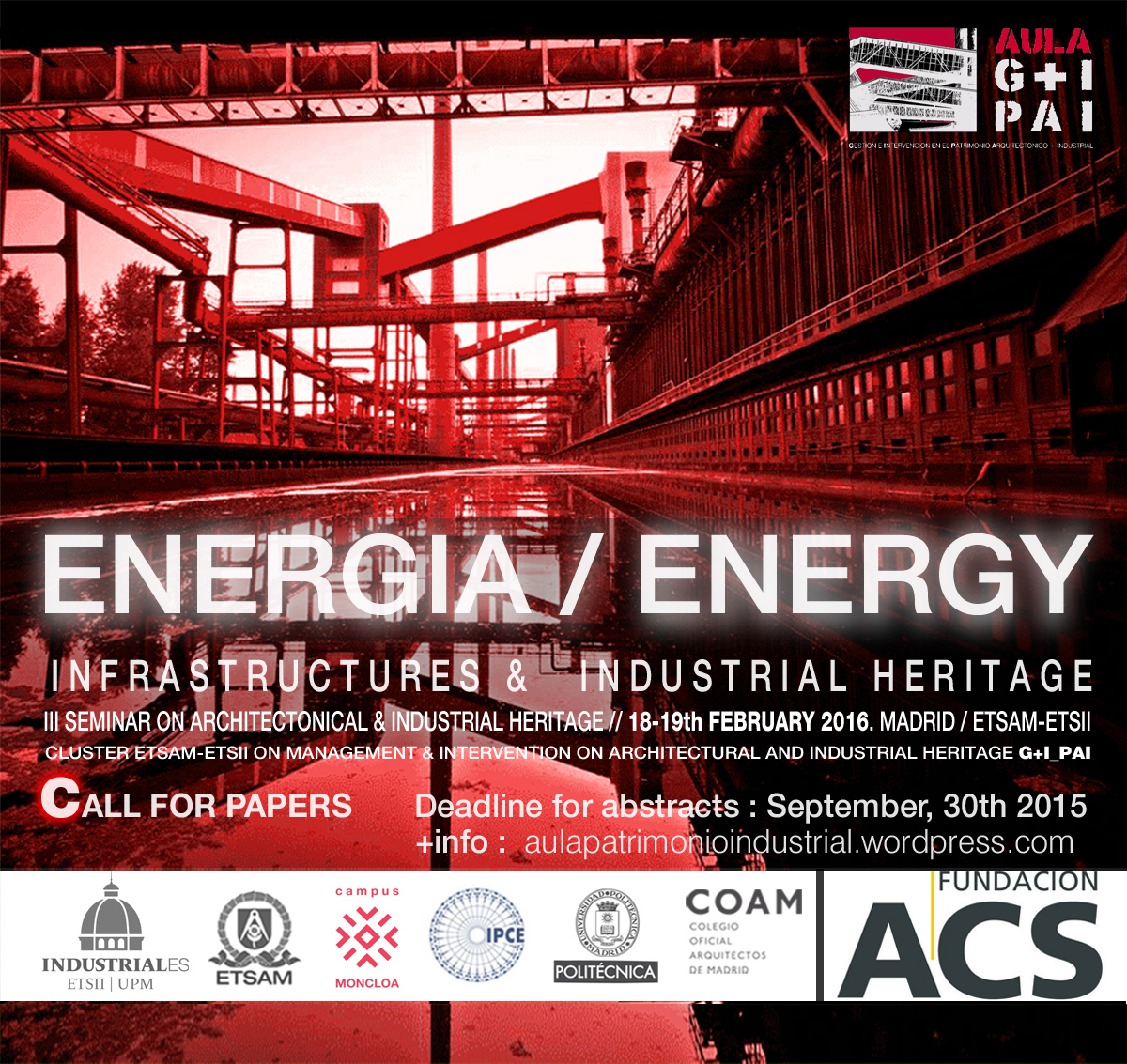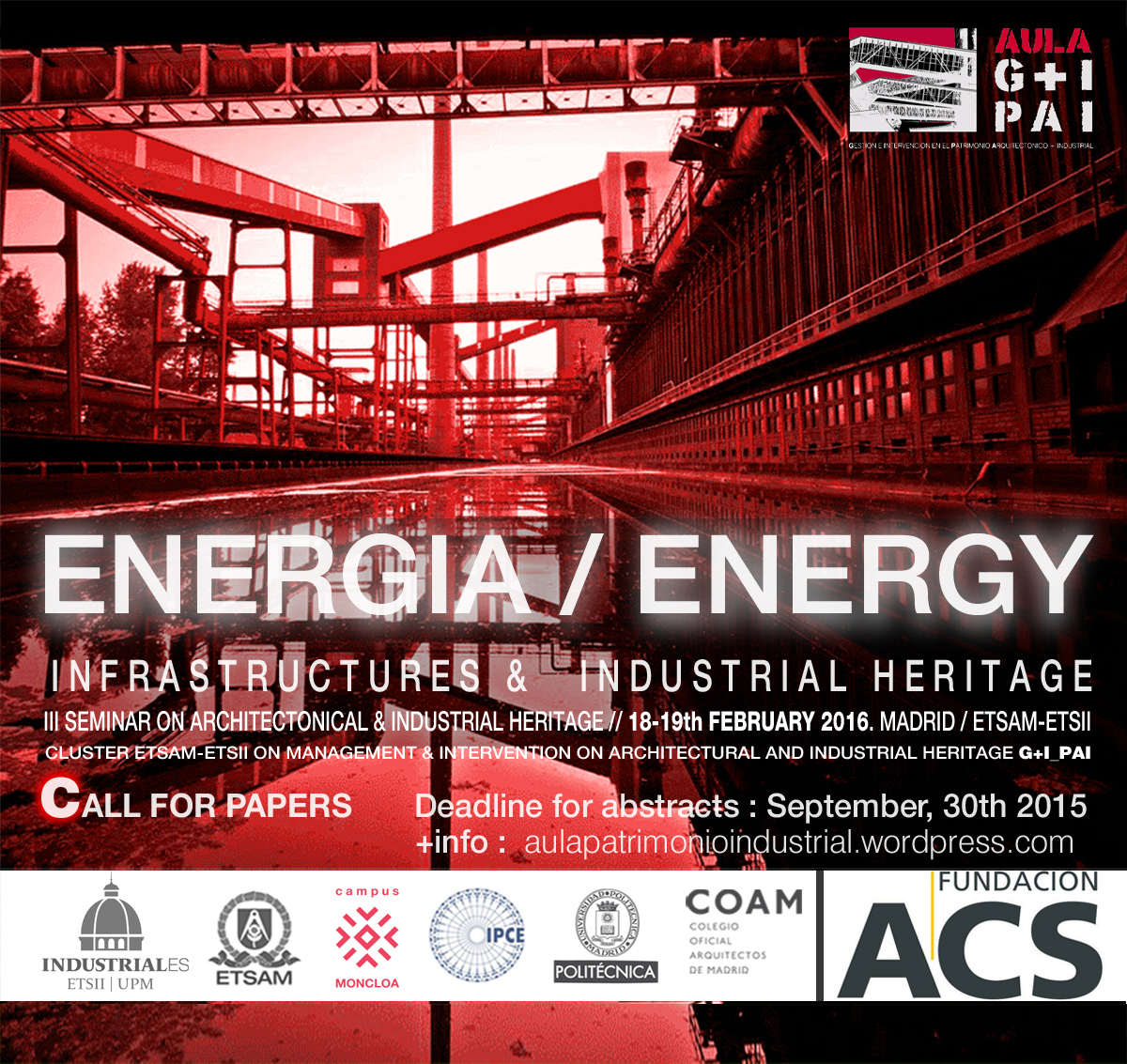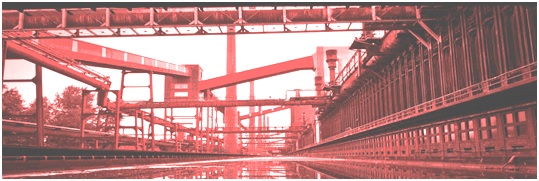ENERGY
Nourishment for cities
The Law of Conservation of Energy states that Energy is neither created nor destroyed, only transformed. Since man inhabits the earth, has made use of available energy sources in their immediate environment: water to turn watermills, wind to push the sails, fuel to create fire … Energy sources, virtually unchanged since ancient times, receive great impetus from the arrival of industrialization. The new mass production requirements need a huge amount of raw material and energy resources, often unavailable in the countries of origin. The colonial expansion and many of the nineteenth century wars have their origin in the search and appropriation of these materials and resources; the economic geostrategy is increasingly replacing the old geopolitics based on military occupation.
The industrialization process alters profoundly a historical landscape that until then had experienced few and slow transformations. The rural-urban balance is quickly reversed, in favour of the latter. New industrial fabrics settle in the vicinity of the necessary materials or energy or, where these are not available, in transport network nodes that allow easy access to resources. Old cities, located on historic sites for political or defensive reasons, give way to new fast-growing urban complexes, connected by sea (port) or land (rail). In most European countries, the development of maritime traffic or new railway lines are more linked to the transport of materials than that of people; ore and coal from Asturias and Leon to feed the blast furnaces of Biscay are the real reason for the foundation of the first Railways in Spain, the “Compañia de Ferrocarriles del Norte” (Company of the Iron Ways of the North).
Not only production requires an enormous amount of energy resources: the emigration process and rapid growth of industrial cities break the so far established balance, based on outdated customs and traditions. The new scale of urban areas, along with its rapid development, requires new infrastructure networks, fuelled by an energy that must be transported to cities. New areas of production, transport and storage must be designed: architects and engineers are forced to shape new typologies for which there is no precedent in historic architecture.
Today the energy issue is one of vital importance in the political agenda of any country in the world. Aware of the planet’s limited resources, issues such as sustainability, recycling and efficiency are imposed as a pressing need. At this scenario, many of the areas of production, processing or storage of energies have become nowadays completely obsolete due to their inefficiency or high cost, both in economic terms or environmental impact.
Overwhelmed by a city whose growth has come to overflow, losing their peripheral status, many of the old equipment that fuelled human and industrial activity now acquire a condition of centrality in the urban fabric that fatally expose them to the speculative greed. The obsolescence of its generation systems, overtaken by cleaner, more efficient and better developed modern systems endows this industrial heritage a special fragility.
The interest of these typologies, many of them unpublished until recently, their presence as witnesses of an era and a sample of an energy management way, their spatial flexibility and generosity, makes these spaces worthy of study and attention, if not a second life, a new contemporary opportunity that does not renounce to their past or their memory.
Thematic issues
- Extraction Systems (mining, wells, charcoal industries), transport (networks, lines, pipelines…) & storage (deposits, gasometers, storehouses).
- Energy Production (Thermal power plants, hydraulic & hydroelectric, wind power plants, nuclear…)
- Architecture & Energy. New typologies, new necessities. Power plant buildings, management, transport & storage buildings
- Territory & Energy. Infrastructures, networks. Impact on landscape .
- Obsolescence and new uses.
III International Seminar on Architectural & Industrial Heritage
G+I_PAI: ETSAM+ETSII Cluster on management and
Intervention on Architectural and Industrial Heritage
18th – 19th, February, 2016
ABSTRACT SUBMISSION GUIDELINES:
All abstract & papers must be submitted to the G+I_PAI: ETSAM+ETSII Cluster on management and Intervention on Architectural and Industrial Heritage. E-mail: seminariogipai@gmail.com on the appointed dates (see below).
For the previous acceptance of presentations, an abstract should be sent under the following rules: 500 words max., font: Arial 11 pt., and at least, five keywords. Languages: the abstract can be written in Spanish and English (500 words each) or English.
All proposals will run under a two stage scientific selection process, the first selection will be made on received abstracts, the second and definite on the articles; all selected works will be presented by the authors, and published in the seminar proceedings (for articles, see template below).
CALENDAR & DEADLINES:
- Submission of abstracts: 15th Sept, 2015.
- Communication of acceptance of abstracts: 30th Sept, 2015.
- Submission of articles: 15th, Dec, 2015.
- Communication of acceptance of articles: 15th, Jan, 2016.
- Seminar opening: 18th, Feb, 2016.
- Seminar closing: 19th, Feb, 2016.
FEES:
- Undergraduate students: free.
- Post graduate students (Master, PHD): 50 € (*)
- Professionals: 100 € (*)
INSCRIPTIONS:
- Deadline for inscriptions: 1st, Jan, 2016.
- Deadline for Inscriptions with 25% surcharge for late fee (*): 12th, Feb, 2016.
(*): An additional charge of 25% will be applied for inscriptions later from 15th, Jan, 2016.
PAYMENT GUIDELINES:
Every payment shall be made trough the Organization’s official bank account that we will soon update.
It is absolutely necessary to send with every application:
* Copy of the bank receipt.
* Application form, duly completed.
* Students: justification or any proof of such status.
These documents must be sent to: seminariogipai@gmail.com
EARLY CANCELLATIONS:
Once the payment made, cancellations for justified reasons could produce fee reimbursements. Applications for reimbursement must be addressed to the seminar’s direction (official e-mail address), including an explanation of the reasons for the cancellation. The reimbursement will be made once the seminar is finished, and after discounting bank charges.
More info and questions: seminariogipai@gmail.com

















